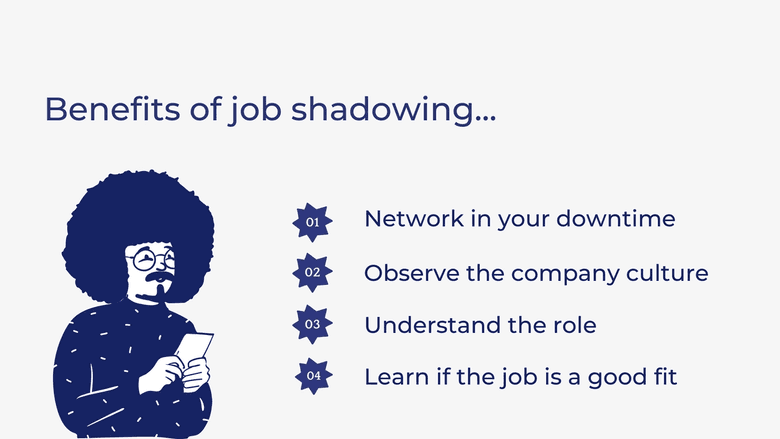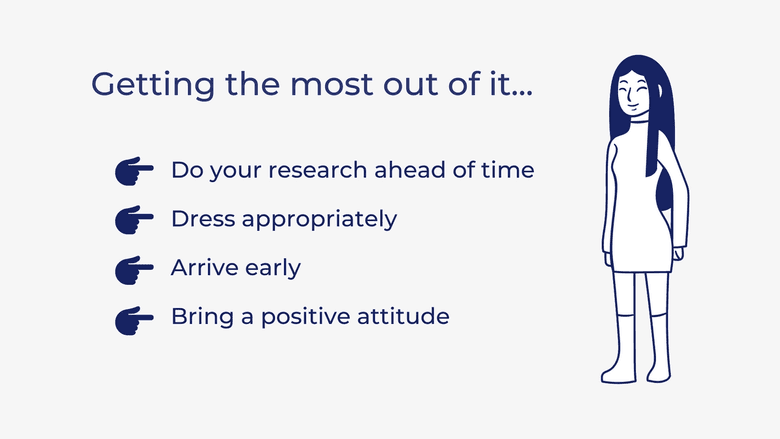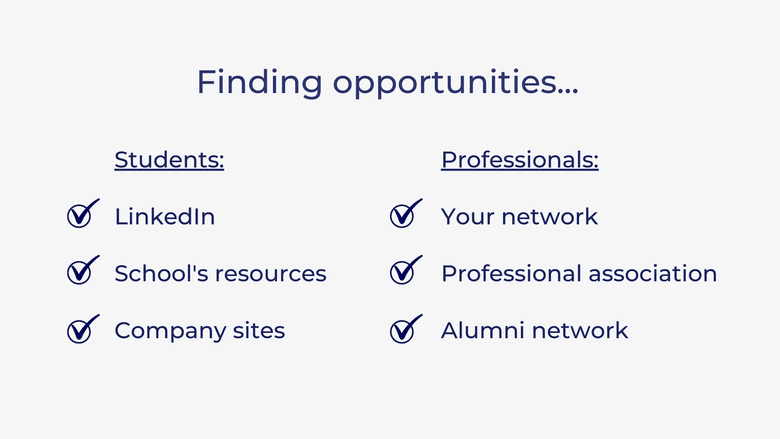How to get the most out of job shadowing
Job shadowing is re-emerging as a powerful way to assess your career options.
Job shadowing provides a rare, first hand experience of what it's like to work for a company.
For some people, job shadowing may seem odd, intimidating, or relatively uncommon for anyone older than 16. In reality, job shadowing can be beneficial to anyone, from high school students to experienced employees considering a career change.
In this article, we'll lay out everything you need to know, starting with the benefits of job shadowing and ending with ways to find the right opportunity for you!
Shadowing can unlock many opportunities

Personal motivations behind job shadowing are going to vary, depending on your age, experience, and target industry. But regardless of who you are, there are a few benefits most job shadowing opportunities will share:
1. Building your network
Whether you're observing, working hands on, or using some combination of job shadowing types, you're bound to meet people at the company. Whether it's during the 10 minutes between meetings or an extended lunch break, use your moments of down time to talk to anyone who's willing.
Don't just treat it like an informational interview-- most people aren't prepared for that during a casual work day.
Do ask some questions about the company, make engaging small talk, and build rapport with the people around you. Not only will this help you gain insight into the type of people who work there, but it can provide you with valuable connections for the future.
2. Gaining insight into the company
Job shadowing provides a rare, first hand experience of what it's like to work for the company. Pay attention to any aspects of the work environment that might be important to you. For example,
- Are managers breathing down employee's necks, or are they more laid back and collaborative?
- Do co-workers seem at ease and happy around one another, or are their interactions brief and professional?
- What values are communicated both directly (verbally, in writing, etc) and indirectly?
Nearly everything, from the way people interact to the way the space is set up, can give you some insight into company culture. Keep an eye out for pieces of this culture and ask yourself if you would enjoy being part of it.
3. Understanding the particular job
This is, of course, the most obvious component of the job shadow experience. In observing or experiencing a particular job, you're bound to learn about a typical day in the profession, its potential pros and cons, and the core processes, skills, and mental models involved in that career path. It's important to pay close attention to these components for a few reasons:
If this is a role you see yourself in, this information will help you tailor resumes and cover letters to this field. Knowing the particular skills required will give you valuable insight into what companies are looking for.
You have the rare opportunity to ask questions about these skills, processes, pros, and cons from someone who's already in the industry. They will likely walk you through some processes without you having to ask, and you have the chance to observe them in real time. Take advantage.
This leads us to a fourth overarching benefit...
4. Learning about yourself
If you pay close attention throughout your job shadowing experience, there is much opportunity for self reflection. It's important to examine both the career path and the company and take the time to think about whether they're right for you.
When it comes to the job itself, ask yourself questions like:
- Did I enjoy the work I did/observed during this program?
- Are the required skills ones that I have or am willing to build?
- What components do I value most when it comes to choosing a career, and did this position fulfill them?
When it comes to the company, ask yourself questions like:
- Did I enjoy interacting with employees here?
- Are the values and obvious cultural components things that I am comfortable with?
- What's most important to me when it comes to choosing an employer, and did I see those components reflected there?
Being in a potential work environment can help you discover what's important to you, what career path to follow, or which company is the right fit. Sometimes, you may find a perfect match. But even if your job shadowing experience doesn't turn out to be a dream come true, there's a lot of valuable information to be gained if you keep an open mind, listen closely, and reflect upon your time there.
How to make the most of it

If you follow the advice listed above (being observant, inquisitive, and reflective), you're already on your way to a successful job shadowing experience. Here are a few more tips to make sure you get the most out of it:
1. Research the company beforehand
I'm sure you already did this to some extent-- after all, there's a reason you wanted to shadow someone there. Before you go in, however, you may want to dig a little deeper. Make sure you have a basic understanding of the work the company does, their size and structure, their values and culture, and anything else you find important. Be prepared to talk about why you chose to shadow at that company-- if you have a well informed answer, it will make you look great!
2. Be well-dressed
These days, company dress codes are all over the place. Some still go for business professional, while others prefer their employees to wear jeans and t-shirts. If possible, ask your company contact (or the person you're shadowing) what is best to wear. If not, dressing more conservatively is your best move-- think business casual.
3. Arrive early and prepared
Get to the job site at least 5 minutes early, equipped with a note taking method (pen and paper, tablet, etc), a water bottle, and anything else you might need for the day. Make sure you're well fed and rested-- adjusting to and observing a new environment can be exhausting, but you want to be as alert as possible throughout your experience.
4. Have the right attitude
Express that you're excited and grateful for the opportunity. Maintain a positive and open minded outlook throughout the day-- you may encounter people, tasks, or aspects of the experience that you did not expect. Try to take them in stride.
5. Bonus: Offer to buy your host lunch
If they have the lunch hour free and you feel comfortable paying, this is a thoughtful gesture. It shows gratitude for their willingness to show you the ropes. And, if you're lucky, they'll show you a tasty restaurant near the workspace (which would come in handy if you end up working there someday).
How to find opportunities

If you're a high school or college student...
1. Search LinkedIn:
Find folks on LinkedIn within the company and position that interests you. Reach out and let them know you're a student interested in shadowing them. People may be especially willing to help if you have something in common with them. For example, if you lived in the same hometown, have mutual friends, went to the same high school or college, or belonged to the same student organization-- reach out to these people first!
2. Leverage your school's resources:
Many schools have alumni networks, company contacts, or knowledge of job shadowing programs. There's a chance they could put you in contact with the right people pretty quickly. Ask your counselor or career office about opportunities you may be interested in.
3. Look into formal job shadowing programs:
Many larger companies offer these opportunities to students. Browse the company site or contact their recruiting/hr department to learn more.
If you're a professional...
1. Leverage your network:
If you're a more experienced professional, odds are you know some powerful people. Whether they're friends from college or professional acquaintances, they may be able to help you out with a job shadowing opportunity. See which of your personal contacts have connections at companies you're interested in (LinkedIn can also be a great tool for this!).
2.Find a professional association:
A quick internet search will likely reveal a ton of professional associations in your field. Whether these networks are more or less formal, in person or digital, they can provide valuable advice, connections, and opportunities for professional development.
3. Join an alumni network:
Many universities, Greek organizations (both social and professional), and honors societies have alumni networks. If you attended college or belonged to any of these organizations, figure out which resources might be available to you!
If you don't have access to an in-person opportunity: See if the companies you like offer virtual job shadowing opportunities. Some employers provide virtual office tours, q&as, and other chances to get to know an organization digitally. Do a quick Google search, browse the company site, or look on their LinkedIn page for opportunities.
The information provided herein is for general informational purposes only and is not intended to provide tax, legal, or investment advice and should not be construed as an offer to sell, a solicitation of an offer to buy, or a recommendation of any security by Candor, its employees and affiliates, or any third-party. Any expressions of opinion or assumptions are for illustrative purposes only and are subject to change without notice. Past performance is not a guarantee of future results and the opinions presented herein should not be viewed as an indicator of future performance. Investing in securities involves risk. Loss of principal is possible.
Third-party data has been obtained from sources we believe to be reliable; however, its accuracy, completeness, or reliability cannot be guaranteed. Candor does not receive compensation to promote or discuss any particular Company; however, Candor, its employees and affiliates, and/or its clients may hold positions in securities of the Companies discussed.
